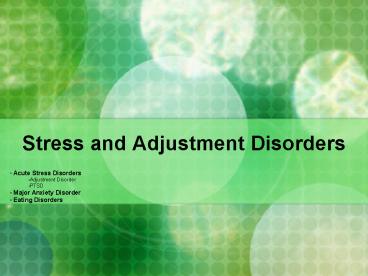Stress and Adjustment Disorders - PowerPoint PPT Presentation
1 / 12
Title:
Stress and Adjustment Disorders
Description:
The adjustive demands placed on an organism. ... Psychotropic medications. Suppression of natural warning signs. Future reliance on medication ... – PowerPoint PPT presentation
Number of Views:42
Avg rating:3.0/5.0
Title: Stress and Adjustment Disorders
1
Stress and Adjustment Disorders
- Acute Stress Disorders
- Adjustment Disorder
- PTSD
- Major Anxiety Disorder
- Eating Disorders
2
Acute Stress Disorders
- Stress
- The adjustive demands placed on an organism.
- The organisms internal biological and
psychological responses to demands. - Stress is a by-product of poor or inadequate
coping. - Eustress (positive stress) and distress (negative
stress) tax a persons coping skills
3
Acute Stress Disorders
- Factors predesposing a person to stress
- Nature of the stressor.
- Experience of the crisis.
- Life changes.
- Persons perception of the stressor.
- Individuals stress tolerance.
- A lack of external resourcesand social support.
4
Acute Stress Disorder
- Effects of severe stress
- Extreme or prolonged stress can bring about
extensive physical and psychological problems - Stress can affect the sympathetic nervous system
- Stress can affect the immune system
- Lowered efficacy
- Depletion of adaptive resources
- Wear and tear on the biological system
- Severe personality and physical deterioration
- Death
- Allostasis The process of adaptation or
achieving - stability through change.
5
Acute Stress DisorderAdjustment Disorder
- Adjustment Disorder
- A person is said to have an adjustment disorder
if the persons response to a common stressor - Is maladaptive
- Occurs within 3 months of the stressor
- Stressors that typically cause adjustment
disorder include - Unemployment
- Bereavement
- Divorce or separation
6
Acute Stress Disorder
- Acute stress disorder
- Occurs within 4 weeks of a traumatic event.
- Lasts for a minimum of 2 days and a maximum of 4
weeks. - If the symptoms last longer, the appropriate
diagnosis is PTSD
7
Acute Stress DisorderPTSD
- Post Traumatic Stress Disorder
- Severe psychological and physical symptoms can
result from sudden unexpected environmental
crises. - These severe symptoms can include
- Persistently re-experiencing the traumatic event
- Persistently avoiding stimuli associated with the
trauma - Chronic tension, irritability, and insomnia
- Impaired concentration and memory
- Feelings of depression
8
Acute Stress DisorderPTSD
- Half of all US adults will experience a traumatic
- event, but only 7.8 will develop PTSD.
- PTSD Prevalence
- Rape
- Military
- Other less prevalent
- Imprisonment
- Forced migration
- Being held hostage
- Torture
9
Acute Stress DisorderPTSD
- Rape
- Most common cause of post-traumatic stress
disorder in women. - Coping stages
- Anticipatory phase
- Begins before the rape
- Impact phase
- Occurs during the rape
- Post-traumatic recoil phase
- Begins immediately after the rape
- Reconstitution phase
- Leaving the emergency room until months later
10
Acute Stress DisorderPTSD
- Rape
- Whether a rape victim will experience serious
psychological problems depends to a large extent
on her - Past coping skills
- Level of psychological functioning
- Women who disclose rape tend to have more
positive and fewer negative reactions.
11
Acute Stress DisorderPTSD
- Military Combat
- Post-traumatic stress disorder is quite common in
soldiers especially - Soldiers involved in abusive violence
- Soldiers involved in graves registration
- Prisoners of war
12
Acute Stress DisorderPTSD
- Treatment
- Short-term crisis therapy
- Debriefing sessions
- Direct exposure therapy
- Telephone hotlines
- Psychotropic medications
- Suppression of natural warning signs
- Future reliance on medication































